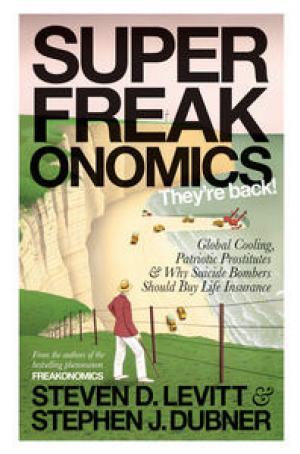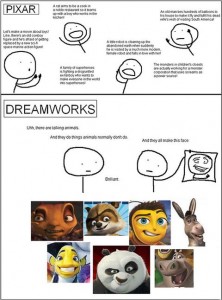links for 2010-09-30
-
Ben Malbon's last post at BBH is the summary of his experiences. Great advice.
-
how to make a great digital campaign? 6 rules to execute by.
-
Stefana Broadbent's research shows how communication tech is capable of cultivating deeper relationships, bringing love across barriers like distance and workplace rules.
Recent Reading: Superfreakonomics
Train rides really help advancing in your reading list. This time I was accompanied by Steven D. Levitt and Stephen J. Dubner’s follow-up to their bestseller Freakonomics: Superfreakonomics
.
The book contains a couple of gems of information that will always come handy at parties, like the fact that after sex changes men (who originally used to be women) will earn more than before, while their newly female counterparts will see their salaries drop.
The main theme of Superfreakonomics is the power and importance of incentives. The question why people do things or how they could be motivated to do things is the red thread along which Levitt and Dubner shed light at subjects like prostitution, altruism, global warming, terrorism and simple solutions. For instance, the best motivation for hospital staff and doctors to wash their hands is to have them culture their hands‘ surfaces in petri dishes and display the colorful results on all screen savers in the clinic. In that aspect Superfreakonomics is stuffed full with the interesting.
When Dubner (I believe that’s his shtick) drifts off to see whether the infamous Kitty Genovese incident might have been inaccurately reported or covers many different viewpoints and ideas on global warming, plus some science fiction sounding solutions, I was not too excited.
The freakonomicists are most interesting when they let data and science reveal the unexpected: how for instance TV did more to empower women in India than all prior government interventions. The short last chapter is a highlight: it describes Keith Chen’s experiment in which capuchin monkeys were taught the concept of money (exchanging coins for food). It resulted in the monkeys behaving like stock-market investors at the prospect of loss, but also in theft, greed and …wait for it… prostitution. The experiment was halted because it was feared that it would damage the monkey’s social structure.
In summary, Superfreakonomics is a good, entertaining and insightful read, though not as great as the first book. I still read it in one go.
How Good People Turn Evil
This is a presentation I wrote and gave some months ago at a university course aptly named „Presentation Skills“. I revisited it yesterday and figured it is worth posting because it is an issue that is quite close to my heart.
Most of the presentation is based on Phil Zimbardo’s excellent book The Lucifer Effect: How Good People Turn Evil. Zimbardo is best known for conducting the 1971 Stanford Prison Experiment and he revisited his notorious experiment while working as an advisor for the defense in the Abu Ghraib trials. His report of the experiment, but also of other crimes and the Abu Ghraib abuses is chilling, but it is worth reading because he filters his findings into 7 factors that take good people down the road to evil. Very simple truths that can be observed wherever we hurt each other.
We should pay more attention to his final advice to stress the normal in heroes and empower everybody to be ready to assume this role themselves. Here is a behavior that I would really love to positively influence.
If you want to see him present in person, take a look at his presentation at TED.com:
Lessons from Pixar
I saw this video of a talk by Ed Catmull of Pixar at the Stanford Graduate School of Business quite a while back. A super interesting talk and a must for everybody managing creative environments. Simon Law’s presentation reminded me a lot of this. Because great is not something that is achieved by one person, but by a team. And the black magic is probably to bring together such a team. In these 55 minutes Catmull tells some very interesting lessons Pixar learned over the years.
Here is what I learned (there is much more in it, these are just my points):
1) Create a team that can be necessarily honest. It must be safe to speak the truth.
As Catmull says, it takes a lot of maturity and professionalism to do this. This is the most important and the hardest thing.
2) Review frequently, best daily. Review when incomplete, in-the-works stuff. Do not wait until done, because when you’re done, you’re done. First, this takes embarassment, because you do it every day. It enables to make things right and better before they are past the line of no return and it makes you more creative.
3) To achieve quality, you have to aim for quality without compromise. It’s never too late for quality or great. If you go for good enough you’ll get less than good enough.
4) Very simple principle: „Once one can articulate an important idea into a concise statement, then one can use the statement and not have to have a fear of changing behavior.“
So many mantras do exist but do in no way change the behavior of the companies claiming them. It is true for brands, for advertising agencies, for account planners, for any creative venture. Especially in advertising because we formulate these concise statements all the time (Disruption, Brand Ideals, Truth well told and so forth). Too often they become blinds that hide the question „What do we actually do?“.
There is a very nice illustration making the rounds on the web, which captures the difference between Pixar and, well, everybody else. (Note that there are no images needed to sell the idea, just simple sentences)
On a side note, Catmull’s background was neither business manager nor a creative, but computer science. His approach is more like a programmer searching for a bug. More managers should be like him.
Great vs. Good
This is the presentation Simon Law, planning director of new True Worldwide gave here at Miami Ad School Europe. His key point was that today, as the advertising industry has evolved into a mature business, has learned and mastered many things, most of the work actually is good. (Or not as bad as it used to be.) In this environment only great work will stand out and it harder to achieve than ever.
I liked about his presentation that it did not bring up only the usual suspects of great work, but a few older and not exhaustedly reblogged examples. And some with very interesting angles.
Of course, if you are expecting a formula or recipe for instant great, there is no such thing. Only hard work, sweat and tears, mastering the craft, brutal honesty with yourself and most importantly: resisting the temptation of good.
You get the answers you ask for.
Yesterday, I learned that Henri Ford’s classic „If I had asked people what they wanted, they would have said faster horses.“-soundbite is usually quoted when people prepare to lash out at market research.
Funny, I always understood it as a criticism of stupid questions.
You always get the answers you ask for. Or deserve.
That is all.
Adding intangible value
Out of nowhere I ran again across this small section of Rory Sutherland’s „Life lessons from an ad man“ talk at TEDGlobal 2009. I had forgotten how interesting and brilliant, filled to the brim with awesome it was. If you like this small section, you will enjoy all the highly recommended 17 minutes.
www.ted.com
Rory Sutherland’s blog at Brandrepublic
Account Planning Boot Camp 2010
This is a bit delayed. Upon arriving in Hamburg the plan was to immediatedly and regularly blog everything that is happening here at Miami Ad School Europe. Now we are through with the third week and here is my first post. So much for ambitious plans.
The name Boot Camp really lives up to it’s sweat-promising name. We were sweating literally, but that was also due to the unusual heat here in Hamburg. Boot Camp wise, the first weeks felt like more like four with so many new ideas, new people, presentations, new things learned and it takes some time to process it all.
I will hopefully commence regular transmissions from the field by Sunday. Until then, here is a photo of the Account Planning Boot Campers 2010 courtesy of the phantastic Olaf Kroenke.
We are quite a diverse bunch from Brazil, Switzerland, Spain, Germany, Latvia and Austria. Some with experience in planning, some in account management, some in creative and some fresh from school.
links for 2010-07-24
- « Previous Page
- 1
- …
- 5
- 6
- 7
- 8
- 9
- …
- 14
- Next Page »



